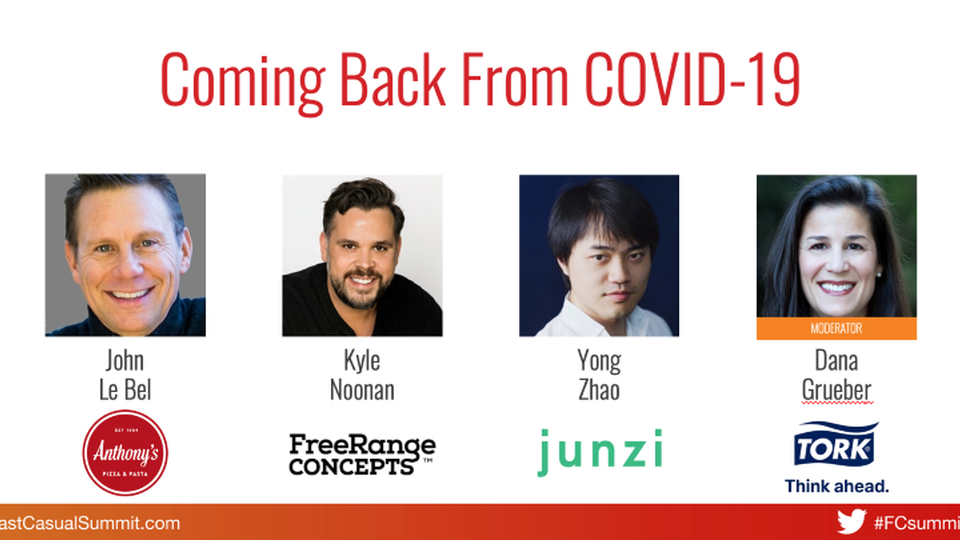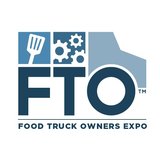Fast Casual Executive Summit
Coming back from COVID-19: Tips, strategies and a silver lining
A panel of fast casual brand leaders shared how they're on a comeback trail post COVID-19 during the recent Fast Casual Executive Summit as well as insight on what proved successful and best practices for managing future disruptive challenges.

November 10, 2020 by Judy Mottl — Editor, RetailCustomerExperience.com & DigitalSignageToday.com
The year 2020 is proving to be one of the most challenging, if not the most challenging, for the fast casual restaurant industry given the COVID-19 pandemic.
Survival, at the initial outbreak in early spring, prompted unprecedented activity from ensuring the health and safety of employees and customers to wrestling with months of shutdowns and reduced operating hours given legal mandates across the country.
Now the fast casual industry is on a rebound path while grappling with a second, and as serious, coronavirus outbreak.
Rebounding and staying resilient was the focus of a panel session, "Coming Back From COVID-19," at the recent virtual Fast Casual Executive Summit. Brand leaders hip-deep in their rebound strategies shared insight on how they are not only surviving but growing.
The session was one of a dozen-plus talks during the Networld Media Group event, now in its 15th year. Sharing insight was John Le Bel, president and CEO of Anthony's Pizza & Pasta, Free Range Concepts CEO and Owner Kyle Noonan and Yong Zhao, co-founder and CEO of Junzi Kitchen. The panel was sponsored by Tork while Essity North America Senior National Account Manager Dana Grueber served as moderator.
Being prepared can pay off big
At Anthony's Pizza & Pasta a key factor for survival was being prepared just in case of something catastrophic, said Le Bel who has taken his brand from one downtown Denver location to an enterprise of 25 stores.
"I'm a prepper. I prepare for everything," he said, adding one initial challenge was finding needed personal protective equipment and supplies, but the brand's units did a great job getting what was needed in place. "They all went the extra mile to check on employee safety. We were amazing and continue on that course," he said.
Being prepared is just one aspect, said Noonan, who has grown his hospitality and entertainment company into a $50 million dollar enterprise in five years and on pace to eclipse $100 million in revenue by his eighth year.
"You have to be adaptable and nimble. This is not the year to be stuck in your ways," he said, acknowledging that it's difficult to navigate the future without knowing what's ahead. "We key in on our true mission we got back to basics to hone in on what we do and why we do it," he said, adding that it's a challenge to improve and every day will be vastly different. "We're up in sales this year and don't take our success lightly or without gratitude."
Over at Junzi, which Zhao co-founded in 2014 and operates several stores in New York City as well as New Haven, Connecticut, the coronavirus was a big topic well before most U.S.-based fast casuals were hit by its impact. With deep roots in China, as Zhao was born and raised in Liaoning, he had already heard about COVID-19 and was a step ahead in getting prepared.
"If you survive you are stronger and better, and innovation (is) very important," he said regarding how his brand reacted to the pandemic and the economic impact.
A focus on health and safety
From the very start the focus has been on the health and safety of both employees and customers, said the brand leaders.
"No one wants their employees to get sick, so we spent time training, training them [employees] to be safe and teaching franchisees to have good hygienics," said Le Bel. He also recommends "checking up on the little stuff. " "We spent an enormous amount of time with owners to make sure they're meeting rules in each state."
When it came to pandemic regulations from a variety of agencies, most fast casual brands were able to respond quick and fast, explained Noonan, as the restaurant industry has been working with the same agencies for decades on a variety of other issues and was much more prepared than other industries such as airlines.
"The biggest thing we did was give guests and team members a feeling of safety and security and showing what we're doing to make them safe," he said.
Another successful strategy, for Noonan and Le Bel's brands, was embracing technology and advancing capabilities on the digital front.
Le Bel's brand moved quick on a new website for online ordering.
"It was a good time to make changes and work through mistakes. Use this slow time to make things better for the business and you get positives from these times," he said.
Noonan's strategy was similar.
"For us, we were already going down the digital path and getting our customers on board so the silver lining of COVID-19 forced customers to adapt just like we had to adapt and adopt a digital approach," he said. The result? A huge success as membership has doubled for one of his company's brands. "It's part of operations now," he said. "It was a blessing in disguise."







